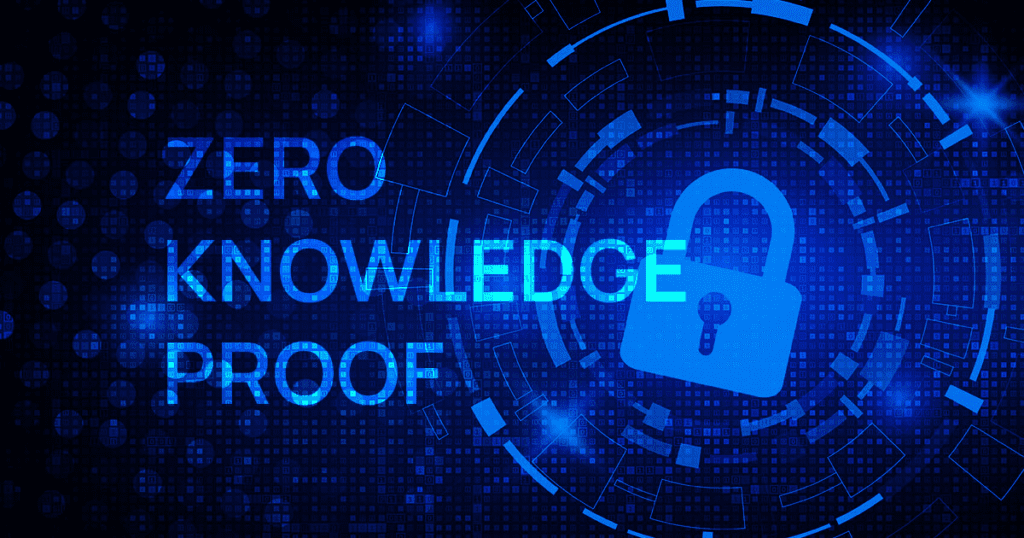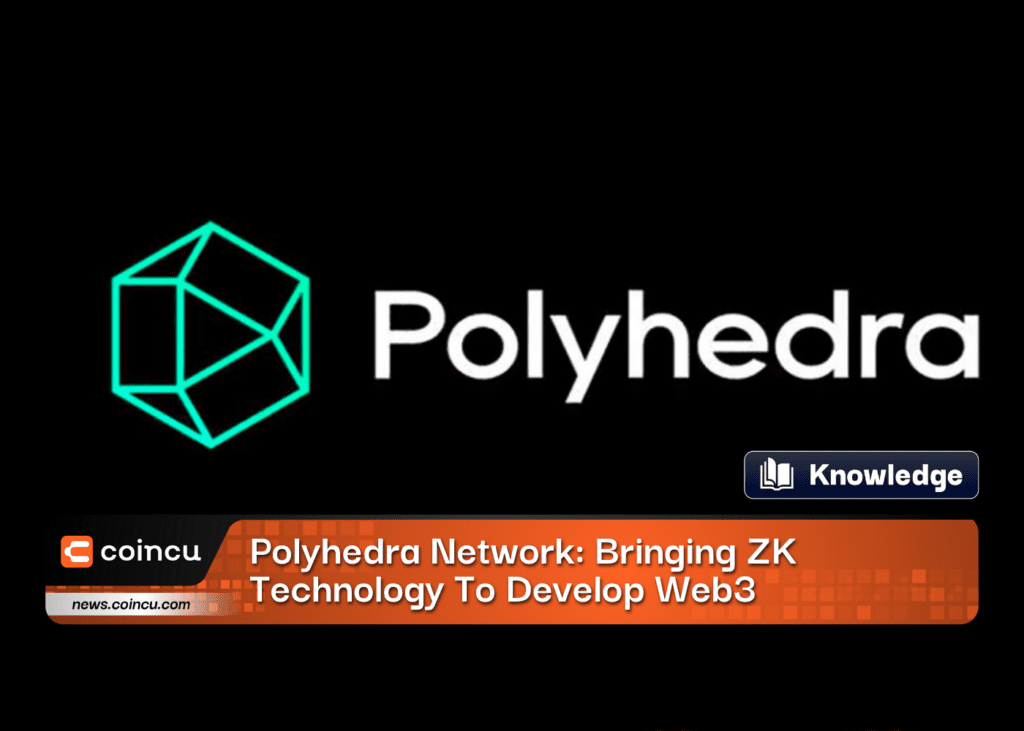Recently, ZK technology has gradually crept into every corner of the Crypto space. A project called Polyhedra Network that aims to bring ZK technology to integrate and develop the Web3 area has raised $10 million in capital from big names like Binance Labs and Polychain Capital. So what is Polyhedra Network? What’s so special about the project is that it can raise capital from those prestigious organizations. Let’s find out through the article below!
What is ZK Technology?

Zero-Knowledge Proof (ZKP) is an advanced technology that proves the authenticity of information without providing all relevant information.
Specifically, in a zero-knowledge transaction, the validator can prove that it has confidential information that the receiver wants to know without disclosing this information to the receiver.
In the cryptocurrency market, ZK-Rollups is one of the most advanced applications of ZKP technology, which is used to solve current blockchain congestion problems, especially on the Ethereum platform.

ZK-Rollups centralizes large amounts of transactions on Ethereum into blocks of data, then processes them off-chain and pushes the final result back on-chain. This improves transaction speed and reduces transaction costs.
Zero Knowledge Proof (ZKP) and Rollups are different technologies with different uses in the blockchain system.
Zero Knowledge Proof (ZKP) is a technology used to prove the correctness of information without disclosing its details. It is used to protect data privacy and security and speed up blockchain transaction processing.
Meanwhile, Rollups is an architecture used to improve the speed and scalability of the blockchain by aggregating transactions into larger bundles of transactions and to process them outside of the main blockchain. Rollups help reduces processing costs and speed up transaction processing on the blockchain.
Although ZKP and Rollups have different purposes, they can be used together to enhance the privacy and scalability of blockchain applications. For example, Rollups can use ZKP to protect data privacy and security and speed up transaction processing.
What is Polyhedra Network?
Polyhedra Network is developing a new infrastructure for Web3 with optimized interoperability and scalability and ensuring privacy through advanced Zero-Knowledge (ZKP) technology.
Polyhedra Network’s interoperability solutions are designed to transfer assets, transmit messages, and share data between Web2 and Web3 systems with minimal reliability.
Polyhedra plans to integrate with more blockchains and make API and SDK tools more accessible to developers.
The project site also plans to refine its ParaPlonk protocol to appeal to developers looking for an efficient and distributed ZK-rollup solution. The company discloses this information in the release.
Currently the project is still in testnet testing and has no plans to launch a token. Users need to be wary of scams
Comprehensive ZK Solution on Web 3.0
Interactive ability
Polyhedra Network is implementing infrastructure for Web3 interoperability between heterogeneous systems and ensures high security without any additional trust assumptions.
Ability of extension
Polyhedra Network is designing and developing scalable and efficient zero-knowledge (ZKP) protocols for large-scale ZKP systems deployed on distributed computer networks.
Security
Polyhedra Network provides granular web security extensions for Web3, including hidden address models, meeting privacy protection, and policy compliance needs.
Polyhedra Network Ecosystem
zkBridge
zkBridge is in beta with a unique system called deVirgo, built on the latest distributed proof-of-concept, to provide a reliable and efficient cross-chain solution for Layer 1 interoperability and Layer 2 on Web3.
The zkBridge protocol and solutions include the following:
- Transferring assets and data across multiple chains.
- Zero-knowledge decentralized credential verification.
- Speeding up zk-rollup with the paraPlonk solution for mitigation costs and encapsulating transactions.
With testnets, users can experience zkBridge’s NFT cross-chain bridge and test its functionality.
zk-DID
This is a scalable and interoperable DID solution based on SBT and verifiable credentials using ZKP, and launched the zkDID testnet. The goal of zkDID is to support millions of verifiable logins per second and help billions of users use Web3 infrastructure and applications. In addition, zkDID uses ZKP to implement a hidden address-based security solution proposed by Vitalik, so that users can have detailed control over their personal information. The zkDID infrastructure is compatible with W3C standards and any verifiable credential data types, and interoperability can be achieved across different Web3 and Web2 systems based on zkBridge, making it possible to significantly simplifies the communication between the Web3 DID system stakeholders.
zk-NFT
An innovative solution from Polyhedra Network is the ZK-NFT protocol, which allows the creation of NFT versions with storage capacity and dynamics, providing greater interactivity. Using zero-knowledge proof and a hidden address model, ZK-NFT ensures the privacy and safety of linked assets.
The ZK-NFT consists of mainly two parts: Data and Asset, which are both pointed by ZK-encrypted pointers. The ZK-NFT can point to dynamically updatable data that could be either stored on-chain or off-chain. The ZK-NFT could also point to any assets including NFTs, FTs, or even another ZK-NFT. Thus the ZK-NFT could be used as an integration of user’s data and website in both Web2 and Web3.
Launchpad
Polyhedra Network provides a feature allowing users to create and deploy NFTs on various chains such as Ethereum, BNB Chain, Polygon, and Avalanche.
Investors & Partners
Polyhedra Network has successfully raised $10 million in a strategic funding round co-hosted by Binance Labs and blockchain-focused investment firm Polychain Capital. In addition, behind the project are other prominent names such as Animoca Brands, Space ID, Metis, and Galxe…
Roadmap
Currently, there is no official announcement about the project Roadmap. However, the startup is building a full suite of systems focused on blockchain interoperability, scalability, and privacy. Protocols and services already include zkBridge that supports cross-chain asset and data transfers, a decentralized identity solution for zero-knowledge authentication, and a paraPlonk scalability solution that helps zk-rollup acceleration, bundle transactions for better speed and lower fees.
On the short-term roadmap, Polyhedra Network plans to integrate the bridge and decentralized identity infrastructure with additional blockchain networks, and launch application programming interfaces (APIs) and toolset. software development tool (SDK) for developers. The company will also continue to develop its paraPlonk solution.
Frequently asked Questions
Has the Polyhedra Network project launched a token yet?
Currently the project is still in testnet testing and has no plans to launch a token. Please pay attention to avoid being scammed!
What is outstanding about the Polyhedra Network project?
In a nutshell, the project uses ZK technology to develop the Web3 space. The features that the project develops will be able to be used to bridge the gap between Web2 and Web3 in the future.
Conclusion
Above are our introductions about the Polyhedra Network project. This is a project that uses ZK technology to develop Web3 space. The project’s feature can help bridge the gap between Web2 and Web3 in the future.
The project is a bit of a future technology (ZK technology), currently this technology shows its benefits in increasing TPS and reducing gas charges on Layer 2. However, in other areas, ZK It is not yet widely adopted and users have not seen a clear impact of this technology compared to what is available in the Crypto space.
When ZK-related projects explode, leading to the ZK wave for the Crypto space, maybe Polyhedra Network will be a project that needs attention, but currently with what the project develops, we can’t give it yet. What is concluded.
Hope the article is useful to you. If you have any suggestions, please leave them below in the comments section to make our article better.
DISCLAIMER: The Information on this website is provided as general market commentary and does not constitute investment advice. We encourage you to do your own research before investing.
Join us to keep track of news: https://linktr.ee/coincu
Foxy
Coincu News





